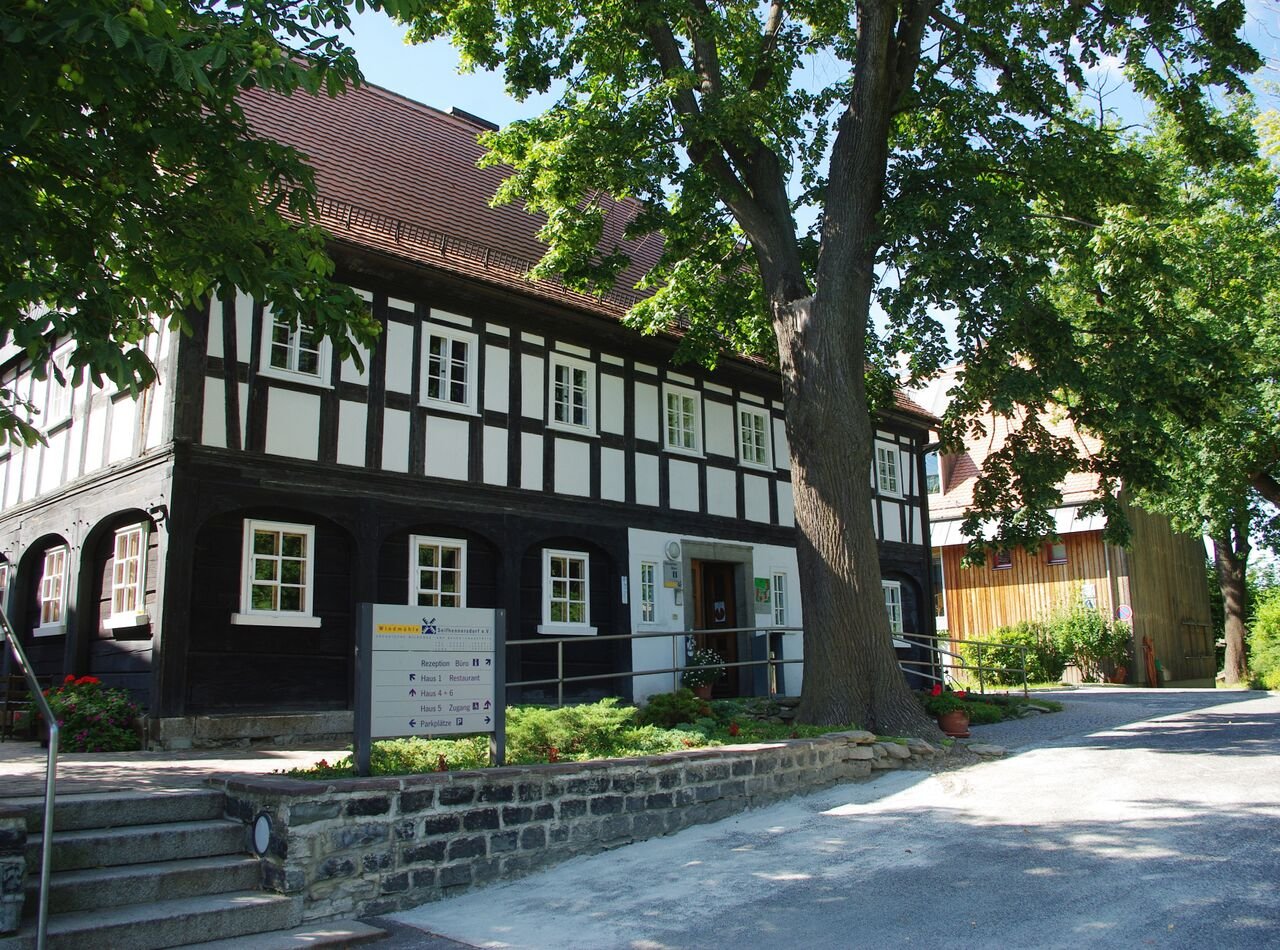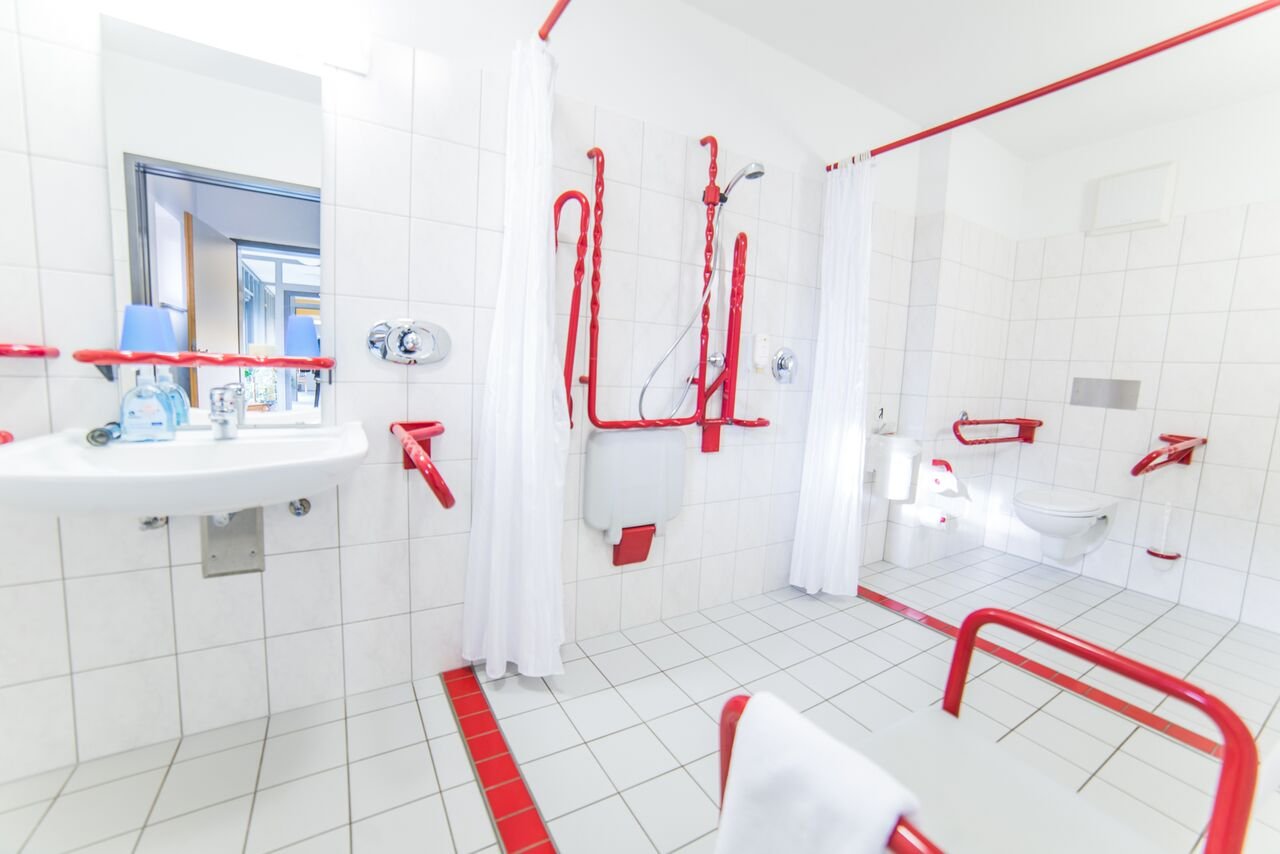Rozhovor s Markusem Kranichem
Závěrečný workshop se bude konat v Bildungs - und Begegnungsstätte Windmühle Seifhennersdorf. O vzdělávacím centru Windmühle, jeho historii, zajímavé podobě i co nabízí handicapovým návštěvníkům jsme si povídali s panem Markusem Kranichem, M.A. předsedou spolku.
Můžete prosím krátce představit Bildungs - und Begegnungsstätte Windmühle Seifhennersdorf?
Windmühle Seifhennersdorf (Větrný mlýn) je tak trochu hybridní dům: někdy je to tříhvězdičkový hotel a místo pro bouřlivé svatební oslavy, někdy konferenční centrum pro mezinárodní kongresy, jJindy se promění vevzdělávací centrum pro mládež – pro soužití mladých lidí z Německa, Česka a Polska, či v kulturní dům – místo pro koncerty, divadlo, kreativní semináře. Slouží i jako místo pro rodinnou dovolenou s mnoha dětmi a jejich (rekreující se) rodiče, či pro skupiny hostů. Nakonec pak často představuje dům prodovolenou, pro trávení volného času a setkávání lidí s postiženími. To vše je Windmühle Seifhennersdorf.
Máme 26 pokojů s celkem 60 lůžky. 4 pokoje jsou kompletně zařízeny pro využití vozíčkáři a vybaveny koupelnou s vanou pro tělesně postižené. Celkem 10 pokojů je na úrovni terénu, a jsou tak vhodné pro osoby s omezenou mobilitou. Dále disponujeme 5 konferenčními sály a máme vlastní gatronomii.
Kdy vzniklo, co nabízí handicapovaným?
Idea vybudovat v tomto domě vzdělávací a setkávací centrum vznikla ještě před mírovou revolucí v roce 1989. Tehdy to však byla opravdu pouze vize, která neměla žádnou šanci stát se skutečností. Se zvovusjednocením Německa a s novými možnostmi byl v roce 1992 založen spolek Windmühle Seifhennersdorf e.V. V roce 1999 se mohl dům otevřít. Tehdy se do vybudování domu investovalo 8 mil. DEM.-.100% dotace Svobodného státu Sasko.
Proč jste se rozhodli poskytovat ubytování pro hendikepované?
I toto v roce 1992 začalo nejprve jako vize.. Prvním ministrem pro sociální věci Svobodného státu Sasko byl Dr. Hans Geisler. Po nástupu do funkce si udělal po celé zemi obrázek o tom, jaká práce ho čeká. Podíval se na všechna zařízení pro děti, všechna pro tělesně postižené, všechny nemocnice. Jeho rozhodnutí bylo tehdy překvapivé: chtěl se jako první věnovat právě zařízením pro postižené. Tito lidé za socializmu trpěli nejvíce, jejich předpokládaná délka života byla nejkratší. Lidé s postižením měli jako první poznat, že se změnily politické a společenské poměry. V důsledku toho byl i náš dům jako vzdělávací a setkávací centrum důsledně vybudován jako bezbariérový. Dnes je trh mnohem větší – zvláště v důsledku demografických změn. Všem hostům s postiženími, kteří dnes náš dům navštěvují, musím však říci: „Stalo se to pro nás srdeční záležitostí!“
Jaký je zájem o ubytování handicapovaných a ohlasy Vašich klientů?
Požíváme mezi ubytovacími a rekreačními zařízeními pro lidi s hendikepem docela dobré pověsti... Máme skupiny hostů, kteří k nám jezdí již 20 let – a to už musí mít nějaký důvod. Snažíme se také čas od času o různé inovace, tak se naši hosté nenudí..
Zájem o ubytování pro lidi s postižením se vyvíjí pouze jedním směrem: poptávka roste.
Co bylo pro Vás nejtěžší a co Vás nejvíce potěšilo nebo co Vás motivuje do budoucna?
Nejtěžší? Cesta od obecně prospěšné organizace, která byla myšlena jako opatření pro začlenění nezaměstnaných na trh práce, na volný trh. Když jsem zde jako jednatel začínal, byla nezaměstnanost velmi velká a věkový průměr pracujícího obyvatelstva v příhraničí vysoký. V této době platil spolek pouze polovinu zaměstnanců, druhou polovinu financoval stát. Dnes na trhu práce téměř nelze sehnat personál a jako spolek neseme všechny personální náklady sami. Ty se nám během osmi let ztrojnásobily. To byla a stále je těžká cesta.
Co nás nejvíce bavilo? Že to funguje :). Lidé jezdí do Windmühle rádi, aby něco prožili, něco zvláštního. A my pracujeme jako tým každý den na tom, aby vše fungovalo.
Co mě motivuje? Je tady ještě tolik práce! Máme na programu německo-česko-polský projekt. Budeme náš komplex ještě jednou rozšiřovat. Chceme pomoci v tomto regionu rozvíjet cestovní ruch jako celek. A chceme, aby nás jako kolegy práce bavila. To mě motivuje: dělat něco dobrého pro zaměstnance a pro hosty.
Děkujeme za rozhovor a ať se Vám ve vaší práci nadále daří podle Vašich představ.







